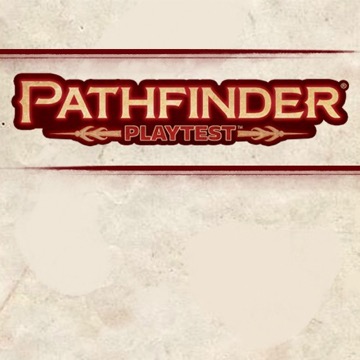As we draw ever closer to the end of the playtest, there are still a number of questions we need to ask you about the way the game works and how that's conveyed to you in the book. Today, we're launching a pair of surveys that do just that, one focusing on presentation and another focusing on magic.
Presentation
First up, we have a survey looking at the presentation of the book. This survey looks at our use of symbols, color, and language to convey game rules to you. We tried some experimental things with the Pathfinder Playtest Rulebook, and want to know what you think of these tests. Your answers will help us determine what the final version of the game actually looks like. When you're ready to take this survey, follow the link below.
Spells and Magic
Next up, we've opened up a survey to look at how spells and magic items work in the game. This isn't the first time we've asked about these topics, but previously, it's always been in the context of other surveys with other goals. This time, we want to know specifically what you think about how magic works in the Pathfinder Playtest.
One of our primary goals in designing the playtest rules was to ensure that spells and magic items are still an integral part of the game, but also to make sure characters who don't rely heavily on such abilities aren't overshadowed. We did this in a variety of ways, but there are some places where it seems clear that the restrictions may have taken away a bit too much from magic and its role in the game. This survey looks at ways that we might add some sizzle back into your lightning bolt and some charm into your, well, charm.
In particular, there are three levers we can manipulate to add power and versatility to magic that we want you to think about when taking this survey:
- Number of spells per day.
- Chance that a spell will succeed (or that foes will fail saving throws).
- Power of individual spells.
Once you've given those some thought, you can find the survey at the link below.
Looking Forward
Finally, I want to take a moment to talk about where we're at right now in the playtest and where we're heading in the future. We've gotten a lot of data about the game, and much of it has been synthesized into a very large list of tasks and things that we need to do to the game before it goes to the printer next year. In the coming months, the playtest will draw to a close, and there will be no additional public updates to the rules while we focus on making changes to the game.
That said, we're not going to leave you without an idea of where things are going. Next week, we'll be dropping an absolutely huge Update 1.6, which adds or adjusts aspects of every class in the game! This ranges from a small alteration in stances that affects the fighter to major changes for the alchemist and paladin. We think you'll see a lot of your concerns addressed in some of these changes, and the best part is, these are just a fraction of what we're doing behind the scenes to make the game even better!
As always, I want to thank each and every one of you for participating in this playtest. The game is really shaping up to be something great, and you helped make that happen!
Jason Bulmahn
Director of Game Design
Join the Pathfinder Playtest designers every Friday throughout the playtest on our Twitch Channel to hear all about the process and chat directly with the team.









